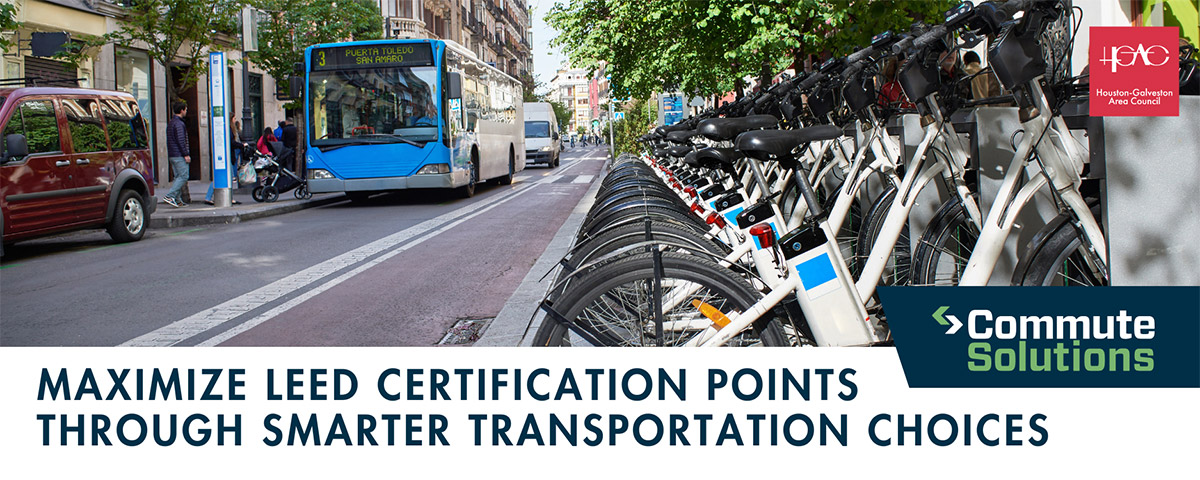Apr 30, 2025
HOUSTON, TX – Earning LEED (Leadership in Energy and Environmental Design) certification is more than just good PR – It’s a strategic investment that pays off. For commercial developers and building owners, it means increased property value, lower operating costs, and stronger tenant appeal. And when it comes to achieving certifications, transportation offers a flexible, cost-effective pathway to earn valuable LEED points.
Why Transportation Credits Matter
Transportation-related LEED credits are often overlooked—but they can make a big impact. These credits reward projects that reduce vehicle miles traveled, alternative transportation, and encourage walkability and transit access. Even better, many of these strategies require minimal upfront investment and can be easily integrated into site planning, design, and operations.
Opportunities You Might be Missing
That means commuting habits, bicycle storage, electric vehicle (EV) charging stations, carpool support, and proximity to transit lines can all contribute to your score. If you haven’t explored these options, you may be missing out on points that are already within reach.
Transportation Strategies to Earn LEED Points for New and Existing Buildings
Whether you’re pursuing LEED certification for a new project or existing property, integrating smart transportation strategies is a practical and impactful way to gain points. LEED offers multiple credits across its rating systems—Building Design and Construction (BD+C) and Building Operations and Maintenance (O+M)—that reward projects for improving access to transit, reducing care dependency, and encouraging active and low-emission commuting.
LEED for Building Design and Construction (BD+C)
Applies to new construction and major renovations.
View the LEED Building Design and Construction Getting Started Guide
Access to Quality Transit (5 points)
- Encourages development in locations served by robust transit networks.
- Points are awarded based on the number of accessible transit trips within walking distance of a project site or project-sponsored transit service.
- Supports reductions in greenhouse gas emissions and promotes active transportation.
Bicycle Facilities (1 point)
- Rewards projects that support cycling as a primary mode of transportation.
- Points are earned by providing secure bike storage for occupants and visitors, along with shower and changing facilities for regular occupants.
- Reduces parking demand and encourages zero-emissions commuting.
Reduced Parking Footprint (1 point)
- Minimize environmental impact by encouraging reduced reliance on personal vehicles and promotes efficient land use.
- Points are awarded by minimizing parking capacity, prioritizing preferred parking for carpools/vanpools, or implementing parking pricing strategies, such as daily fees that exceed round-trip transit fare.
LEED for Neighborhood Development (up to 16 points)
- Projects located within or adjacent to a LEED-certified Neighborhood Development project may earn additional points.
- Recognizes locations that reduce vehicle distance traveled, support walkability, and offer strong connections to existing infrastructure.
LEED for Building Operations & Maintenance (O+M)
Applies to existing buildings and occupied structures.
View the LEED Building Operations and Maintenance Guide
Location and Transportation (up to 14 points)
- Evaluates the carbon (CO2) impact of commuting patterns to and from the building.
- Requires an annual transportation survey of building occupants to assess modes of travel and CO2 emissions from commuting.
- Scores are benchmarked against high-performing buildings globally.
Alternative Commuting Transportation (up to 15 points)
- Recognizes projects that reduce conventional commuting trips through programs and infrastructure that support: public transit, walking and biking, telecommuting and compressed workweeks, carpools, vanpools, and rideshare options.
- Points are based on the percentage reduction in conventional commuting trips during the performance period.
Make Smarter Transportation Work for Your Project
Since LEED inception in 2000, nearly 4 billion vehicle miles traveled (VMT) have been avoided by occupants of LEED-certified buildings, according to the U.S. Green Building Council. This reduction is attributed to strategic location planning and enhanced access to alternative transportation options.
Transportation-related LEED credits are not only attainable—they’re strategic. They help reduce environmental impact, increase tenant satisfaction, and improve marketability. Whether you’re breaking ground or optimizing an existing property, investing in sustainable transportation options is a win for both certification and long-term value.
Partner with the Houston-Galveston Area Council Commute Solutions team to strengthen your LEED strategy and advance regional mobility.
Our experts will work with you to:
- Design and implement effective commuter surveys to gather actionable data.
- Identify and leverage local public transportation options.
- Establish tailored vanpool or carpool programs.
- Facilitate engaging, on-site lunch-n-learn sessions to promote sustainable commuting.
- Deliver strategic marketing and communication support to amplify your efforts.
Ready to Take the Next Step?
Email us at [email protected] or call 832-681-2622.



